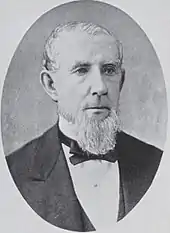William Parkin
William Parkin (24 August 1801 – 31 May 1889) was a businessman politician and philanthropist in the early days of the Colony of South Australia

History
Parkin was a native of Glastonbury, near Barnstaple, and emigrated to South Australia on the Recovery, arriving in September 1839. He operated a drapery on Hindley Street (later the site of Miller Anderson's) then at 30 Rundle Street, next to the Globe Hotel, with G. W. Chinner[lower-alpha 1] (There are parallels with fellow-parliamentarian John Hodgkiss.) He engaged his nephew John William Parkin (c. 1844 – 19 August 1882) to manage the store, but later regretted having done so; disowned the nephew and sold the business to James Marshall & Co.[1]
He had a seat on the board of the Kadina and Wallaroo Railway Company, and was part owner of The Advertiser.
Politics
He represented City of Adelaide in the Legislative Assembly from March 1860 to 1862 and won a seat in the Legislative Council in 1866 and retired February 1877.
Churchman and philanthropist
He was a member of the Freeman Street Congregationalist church then Glenelg, where the pastor was the Rev. C. Manthorpe.
He was a member of the committee under Rev. C. W. Evan, set up to erect the Stow Memorial Church, named for T. Q. Stow. Others were Richard Hanson, Thomas Graves, John Brown, John Davis, Horace Dean, Robert Davenport, Thomas Barlow, William Berry, Samuel Davenport, William Hanson, Henry Giles, Matthew Goode, Carrington Smedley, Clement Sabine, Robert Stuckey, Charles Todd, George White, Alexander Hay.[2]
In 1877 he founded the Parkin Trust to benefit those studying for the Congregational ministry. Parkin College was founded with an endowment of £8,000 and 4,160 acres of land near Darwin, Northern Territory, and left another £16,000 in his Will.
He also endowed the Parkin Congregational Mission of South Australia, whose object was to maintain missions in the remote regions of South Australia and the Northern Territory; the value of his endowments to the Congregational Church totaled between £30,000 and £40,000[3]
Family
He married twice: on 16 May 1832 to Sarah Mary Carill (c. 1814 – 23 March 1871) and on 28 February 1872 to Ellen Stonehouse (died 13 May 1925), daughter of Rev. George Stonehouse. They lived at "Plympton House", New Plympton; after his death she lived at "Stonehenge", Partridge Street, Glenelg. He left no children.
Notes and references
- George Williams Chinner (died June 1880) was at one time mayor of Brighton, father of William Bowen Chinner and grandfather of Norman Chinner, both church organists.
- "Advertising". The Evening Journal (Adelaide). XIII (3911). South Australia. 8 November 1881. p. 1. Retrieved 21 January 2021 – via National Library of Australia.
- "Laying the Foundation Stone". The South Australian Advertiser. Adelaide: National Library of Australia. 24 February 1865. p. 5. Retrieved 3 September 2014.
- "Death of Mr. W. Parkin". Adelaide Observer (SA : 1843 - 1904). SA: National Library of Australia. 8 June 1889. p. 29. Retrieved 17 August 2015.